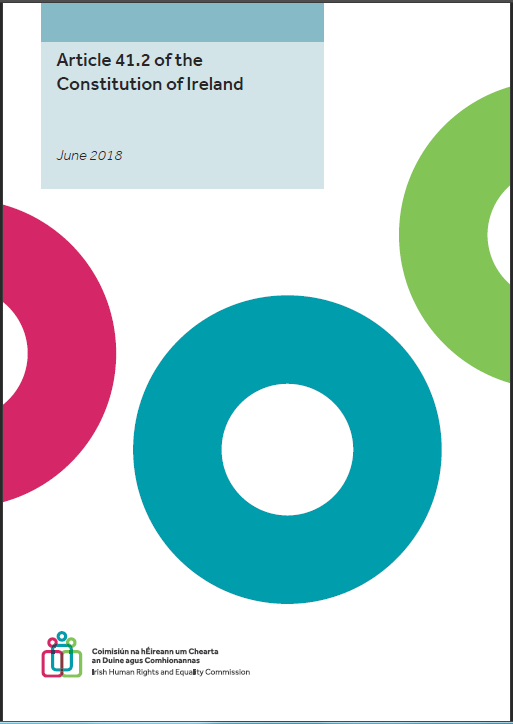Irish Human Rights and Equality Commission Invited to Addresses Oireachtas Members
The Irish Human Rights and Equality Commission (“The Commission”) has this morning told Members of the Oireachtas Joint Committee on Justice and Equality that there is an opportunity provided by an amendment to Article 41.2 of the Constitution not only to delete “an archaic reference” but also “to introduce a compassionate, generous recognition of the public good realised within Ireland’s diverse families and in caring roles.”
Emily Logan, Chief Commissioner, and Commission Members Frank Conaty and Professor Siobhán Mullally, addressed Oireachtas Members and outlined the Commission’s recommendations on the proposed 38th Amendment of The Constitution of Ireland.
The Commission has made specific written recommendations to Oireachtas Members stating that, in its current format, Article 41.2 perpetuates stereotypical attitudes towards the role of women in Irish society and is not compatible with Ireland’s international human rights obligations. However, the Commission believes that it would be desirable to amend the provision to make it gender-neutral, and to recognise and support care work undertaken in modern Irish families.
In her opening address to the Oireachtas Joint Committee, Emily Logan, Chief Commissioner of the Irish Human Rights and Equality Commission stated:
“Ireland is in the process of transformation. Our population is ageing, our families are smaller, and often come in diverse forms. In many ways our current national conversation is seeking to understand how we can ensure our fundamental law catches up, in order to be more reflective of our society.
“The Commission believes that an opportunity exists to approach reform of Article 41.2 not only as an exercise in removing an archaic reference, also as a means of introducing a compassionate, generous recognition of the public good realised within Ireland’s diverse families and in caring roles.”
ENDS
For further information, please contact:
Brian Dawson 087 0697095 / bdawson@ihrec.ie
Notes to editor:
The Oireachtas Joint Committee on Justice and Equality proceedings take place in Committee Room 2, Leinster house from 10.00 on Wednesday, 19th September.
The proceedings are streamed and can be watched back on the Oireachtas website.
Policy Statement on Article 41.2 of the Constitution of Ireland
The Commission Policy Statement on Article 41.2 of the Constitution of Ireland was circulated to Oireachtas Members in advance of this hearing and is available at: https://www.ihrec.ie/documents/policy-statement-on-article-41-2-of-the-constitution-of-ireland/
The Commission makes three key recommendations:
- Article 41.2 should be amended to make it gender-neutral.
- Article 41.2 should be amended to reference ‘family life’ and ‘family life‘ should be understood as including a wide range of family relationships and include situations where family members do not live in the same home.
- Article 41.2 should be amended to recognise and support care work.
Irish Human Rights and Equality Commission
The Irish Human Rights and Equality Commission is an independent public body, appointed by the President and directly accountable to the Oireachtas. The Commission has a statutory remit set out under the Irish Human Rights and Equality Commission Act (2014) to protect and promote human rights and equality in Ireland, and build a culture of respect for human rights, equality and intercultural understanding in the State.
The Irish Human Rights and Equality Commission is Ireland’s national human rights institution and is recognised as such by the United Nations. The Commission is also Ireland’s national equality body for the purpose of a range of EU anti-discrimination measures.
The Commission is mandated to keep under review the adequacy and effectiveness of law and practice in the State relating to the protection of human rights and equality and to make recommendations to the Government to strengthen and uphold human rights and equality in the State.
